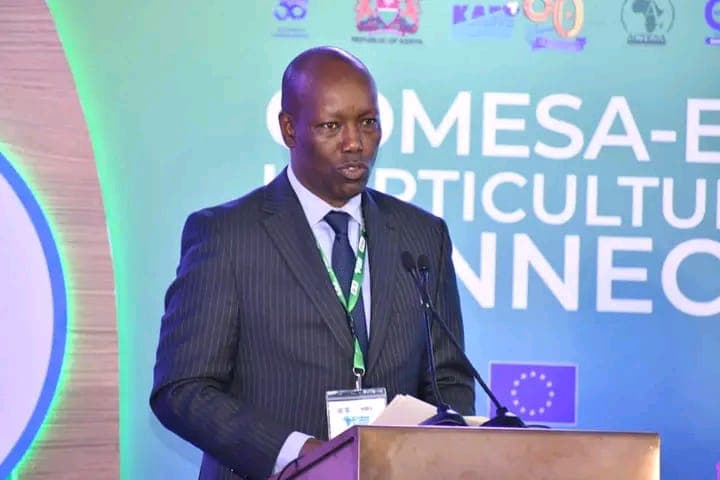We're loading the full news article for you. This includes the article content, images, author information, and related articles.
Trade and Investments Cabinet Secretary Lee Kinyanjui has called for the elimination of non-tariff barriers and unnecessary border stops to boost intra-COMESA trade and regional competitiveness.

Kenya's Cabinet Secretary for Trade and Investments, Lee Kinyanjui, on Tuesday, October 7, 2025, urged member states of the Common Market for East and Southern Africa (COMESA) to dismantle non-tariff barriers and superfluous border stops that impede the free flow of goods and services. Speaking at the 18th COMESA Business Forum held at the Kenya International Convention Centre (KICC) in Nairobi, CS Kinyanjui emphasised that practical measures, beyond theoretical discussions, are crucial for enhancing trade integration within the bloc.
CS Kinyanjui highlighted that delays and bureaucratic hurdles at border points significantly diminish the COMESA region's competitiveness in global markets. He cited a recent conversation between President William Ruto and Ugandan President Yoweri Museveni, where the issue of prolonged border crossing times between Kenya and Uganda was raised. Subsequent visits revealed that truck drivers and business people often experience delays of four to five hours, and sometimes even a full day, to cross the border. This underscores the persistent challenges in achieving seamless regional trade despite existing agreements.
The COMESA Treaty, established in 1994, aims to create a fully integrated, internationally competitive regional economic community. Key provisions include the establishment of a Free Trade Area (FTA), a Customs Union, and the harmonisation of trade and customs procedures to facilitate the movement of goods, services, capital, and people. Despite these frameworks, the implementation of policies to eliminate non-tariff barriers has faced challenges, leading to continued calls for stronger political will and enforcement mechanisms.
The primary stakeholders in this initiative include COMESA member states, their respective trade ministries, customs authorities, and border agencies. Businesses, particularly those involved in cross-border trade, stand to benefit significantly from reduced transit times and costs. Regional economic communities like the East African Community (EAC), which overlaps with COMESA in membership, also play a critical role in harmonising trade policies and facilitating regional integration. Analysts suggest that the private sector, represented by business forums such as the COMESA Business Forum, will be instrumental in advocating for and monitoring the implementation of these reforms.
Failure to address these border inefficiencies could lead to continued economic losses for businesses, reduced foreign direct investment, and hinder the region's overall economic growth. It could also undermine the credibility of regional integration efforts and foster disillusionment among traders. Conversely, successful implementation could significantly boost intra-regional trade, create jobs, and enhance the competitiveness of COMESA economies on the global stage.
Specific timelines for the proposed removal of border stops and barriers remain unclear. The financial implications for member states in implementing these changes, including potential investments in technology and infrastructure, have not been detailed. Furthermore, the exact safeguards to prevent illicit trade while facilitating legitimate commerce require further clarification.
Observers will be keenly watching for concrete policy directives and collaborative initiatives from COMESA member states following CS Kinyanjui's remarks. The focus will be on the establishment of clear implementation timelines, the allocation of resources, and measurable indicators of progress in reducing border delays. The engagement of regional business associations and their feedback on the effectiveness of any new measures will also be critical.
This initiative aligns with broader efforts by the African Union (AU) to foster continental free trade through the African Continental Free Trade Area (AfCFTA), which also seeks to eliminate non-tariff barriers and promote seamless movement of goods and services across Africa.
Keep the conversation in one place—threads here stay linked to the story and in the forums.
Sign in to start a discussion
Start a conversation about this story and keep it linked here.
Other hot threads
E-sports and Gaming Community in Kenya
Active 9 months ago
The Role of Technology in Modern Agriculture (AgriTech)
Active 9 months ago
Popular Recreational Activities Across Counties
Active 9 months ago
Investing in Youth Sports Development Programs
Active 9 months ago
Key figures and persons of interest featured in this article